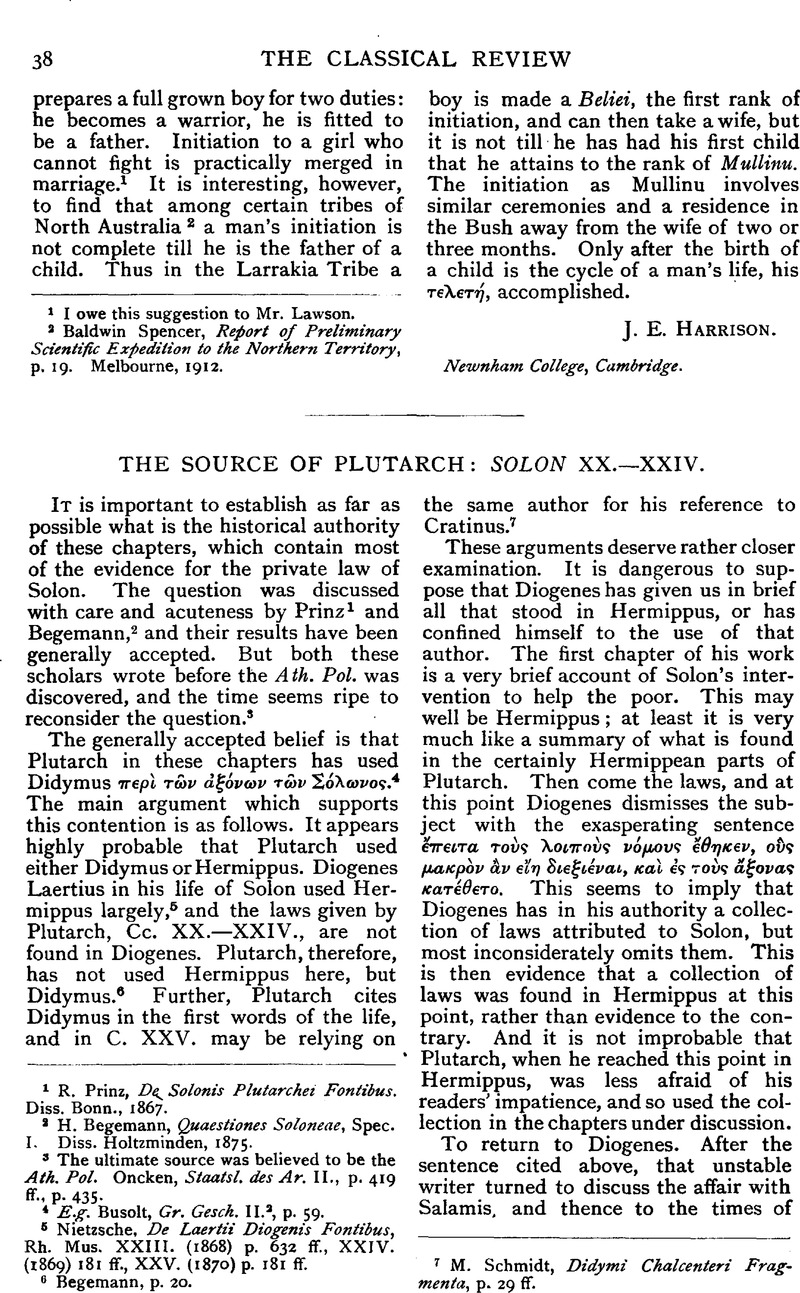No CrossRef data available.
Published online by Cambridge University Press: 27 October 2009

page 38 note 1 Prinz, R., De Solonis Plutarchei Fontibus. Diss. Bonn., 1867Google Scholar.
page 38 note 2 Begemann, H., Quaestiones Soloneae, Spec. I. Diss. Holtzminden, 1875Google Scholar.
page 38 note 3 The ultimate source was believed to be the Ath. Pol. Oncken, Staatsl. des Ar. II., p. 419 ff., p. 435.
page 38 note 4 E.g. Busolt, Gr. Gesch. II.2, p. 59.
page 38 note 5 Nietzsche, , De Laertii Diogenis Fontibus, Rh. Mus. XXIII. (1868) p. 632 ff.Google Scholar, XXIV. (1869) 181 ff., XXV. (1870) p. 181 ff.
page 38 note 6 Begemann, p. 20.
page 38 note 7 Schmidt, M., Didymi Chalcenteri Fragmenta, p. 29 ffGoogle Scholar.
page 39 note 1 A slight indication that this was the case may be seen in the fact that the lexicons which go back in the main to Didymus do not discuss the contents of the laws under the headings ἄξονες or κρβεις, as they might perhaps have done if Didymus had put such information into his book ![]() . Didymus is the probable source of such notes as those on πμορτος (Pollux. VIII. 151), κλπος (ibid., c. 34), πατια (ibid., c. 23); but even these may come from his voluminous λξεις (Schmidt, p. 11 ff.) or from notes on the orators. See Berlin Papyr. and Harpocration,
. Didymus is the probable source of such notes as those on πμορτος (Pollux. VIII. 151), κλπος (ibid., c. 34), πατια (ibid., c. 23); but even these may come from his voluminous λξεις (Schmidt, p. 11 ff.) or from notes on the orators. See Berlin Papyr. and Harpocration, ![]() ; Blass in Hermes, VII., p. 151 ff.
; Blass in Hermes, VII., p. 151 ff.
page 39 note 2 Sandys on Ar. Ath. Pol. 7. § 3; Szanto in Paully-Wissova, s.v. ἄξονες; Gilliard, Quelques Réformes de Solon, p. 30 ff. Didymus' work seems to have been polemic—![]() . Probably there was much in Asclepiades to correct, to judge from Etym. Guder., p. 355, s.v. κρβεις.
. Probably there was much in Asclepiades to correct, to judge from Etym. Guder., p. 355, s.v. κρβεις.
page 39 note 3 ![]() .
.
page 39 note 4 C. 20.
page 39 note 5 Op. cit., p. 16 f.
page 39 note 6 C. 20, 24.
page 39 note 7 Klio, 1912, pp. 1–16.
page 40 note 1 Polemo, Fr. 48, F.H.G., iii. 130; Euphorion ap. Apollod., F.H.G., i. 432.